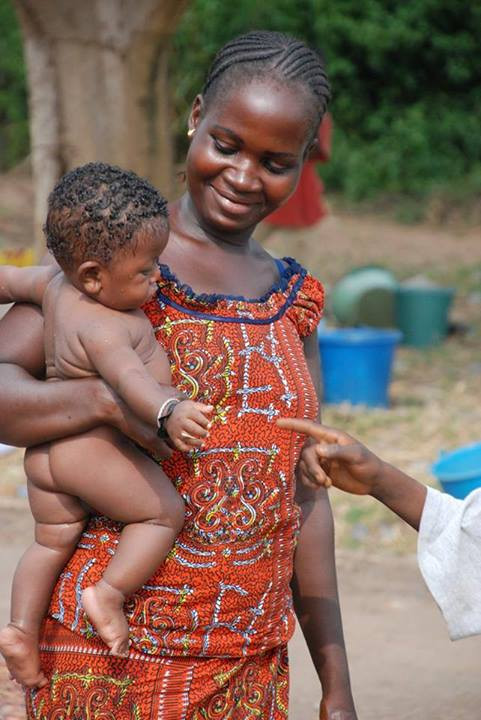People in Need Begins to Help Malnourished Children in the Eastern Congo
Published: Oct 1, 2014 Reading time: 4 minutes Share: Share an articlePeople in Need has been providing long-term medical assistance in the esatern province of Kongo South Kivu through the support of dozens of local health centers in the area. We focused primarily on available medical care for vulnerable groups of inhabitants untill June 2014 - helping families that because of the fighting had lost their homes, women who had been raped or very poor inhabitants from remote villages. For this purpose, almost 4 million CZK from the Club of Friends of People in Need was sent to the Congo just this year. Currently, we are now focusing on combating child malnutrution in South Kivu.

The Congo is still recovering from the long war. The government and administration is non-functional, part of the territory is occupied by the rebels which regularly leads to conflicts, there is widespread sexual violence against women and there has been the expulsion and burning of many villages. People in Need has been working in several areas of the South Kivu province since 2009.
Helping raped women and the victims of epidemics
In recent years, we have helped to equip dozens of local health centers with trained personnel to provide medication. "The primary impetus for us to begin to help in the region, were stories of raped women," explains Michael Sedláčková, head of our programs in the Congo. Over 200,000 women have been raped in the country over the last 10 years. "However our help has grown and People in Need began providing comprehensive health care to all people in the region," adds Sedláčková. With that we continued to help victims of sexual violence even further, - for example we handed out a medication called Postexposure prophylaxis to abused women, which helps prevent HIV infection when administered early.
In addition to this, People in Need also interfered with outbreaks of malaria and cholera. An important part of this was provding direct support of individual medical centers, that could treat the poorest patients for free or at reduced cost.
We have treated the malnutrition of over 1,800 children
Since the end of 2013, People in Need has began to focus on the treatment of malnutrition in children under the age of five. The smallest children are the most vulnerable, and insufficient nutrition at this age can lead to serious consequences in their future physical and mental development.
Volunteers that are trained by People in Need also visit the neighboring villages. They go to all of the homes and discover levels of malnutrition in children by putting their arms though a tri-color ribbon. Children with the thinnest arms come up as a red color on the scale - a symbol of severe malnutrition. We identified severe forms of acute malnutrition in more than 1,800 local children till July 2014. We recommended and administered immediate treatment for these suffering children. The expansion of child malnutrition however, among other things, still remains an explosive situation in the region. Villages are also often threatened or even plundered by the paramilitaries of various armed groups. The villagers must often hide in the forest before the fighting begins and because of this their fields remain fallow.
Treatment of a severe case of malnutrition in a child lasts about 2 months. His mother will continue to visit with him during this period in the medical center, where the child will receive special therapeutic nutrition. Administering peanut paste enriched with sugar, powdered milk, oil, vitamins and minerals is virtually calorie bombing them so that these children can quickly gain necessary nutrients. In the case of accompanying health problems (diarrhea, vomiting or fever), the treatment is more difficult and requires that the child be hospitalized for several weeks. "The vast majority of children have varous types of malaria or uncontrolled diarrhea. These illnesses have contributed to their malnutrition and it is therefore a need to heal them as quickly as possible, "says Michael Sedláčková.
The end of monotonous diet
In addition to the immediate treatment of malnutrition, we try to prevent it too - by doing things such as teaching mothers how to cook meals that are nutritionally rich and balanced. Providing monotonous food choices to children usually doesn´t provide them with all the necessary nutrients for healthy development.
The help provided to malnourished children in Luling will continue for at least a year. We currently supply medicines and therapeutic food to 20 health centers and two hospitals - more than 80,000 mothers with children live in the area. "So far we have managed to cure more than 1,200 children. Mortality during the treatment is encouragingly very low - only 0.3 % of malnourished children we treated we could not save," says Petr Schmied, who is the head of health programs for People in Need.
In addition, in recent years we have started an effort to improve the sanitary facilities of health centers, focusing especially the construction of showers, toilets and rainwater tanks. In addition to all of this, we are spreading the education of hygiene among people in local communities and provide them with access to clean drinking water to help prevent the spread of disease.


Left: measurement of malnutrition in young children (red indicates malnutrition)
Right: nutritional peanut paste used for the treatment of malnourished children
